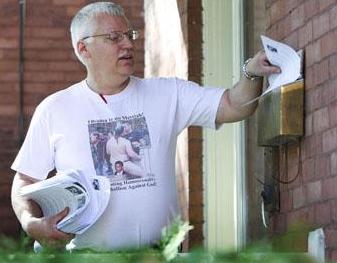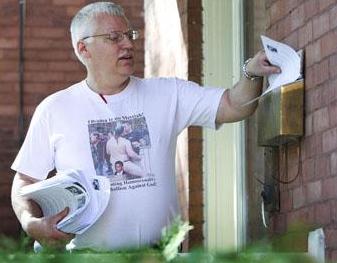
Anti-gay activist Bill Whatcott. Credit: Xtra file photo.
UPDATE — Feb 27, 5pm: The Supreme Court of Canada has upheld part of a 2005 Saskatchewan Human Rights Tribunal ruling against Bill Whatcott, a self-described Christian activist who has distributed flyers targeting gay and lesbian Canadians.
The Supreme Court unanimously ruled that two of the four flyers published and distributed by Whatcott violate the Saskatchewan Human Rights Code.
The ruling noted that the first two flyers, titled “Keep Homosexuality out of Saskatoon’s Public Schools!” and “Sodomites in our Public Schools,” expressly call for “discriminatory treatment of those of same-sex origin” with statements such as “We also believe that for sodomites and lesbians who want to remain in their lifestyle and proselytize vulnerable young people that civil law should discriminate against them.”
“Mr Whatcott therefore combined expression exposing homosexuals to hatred with expression promoting their discriminatory treatment,” read the decision written by Justice Marshall Rothstein. “In my view, it was not unreasonable for the Tribunal to conclude that this expression was more likely than not to expose homosexuals to hatred.”
The court also ruled that the other two pamphlets, reprints of the personal ads from a gay magazine with Whatcott’s written commentary, were offensive but not a violation of the code.
Accordingly, the court instated the tribunal’s decision to award $7,500 in compensation to the two complainants who received the prohibited flyers but did not reinstate the $10,000 in compensation awarded to the two complainants who received the non-prohibited flyers. The court also awarded the appellant’s legal costs, which have yet to be calculated.
“I think this is a flawed ruling and one that Christians should disobey at every opportunity and continue to preach what is true, that homosexual behaviour is harmful and not pleasing to God,” Whatcott said from his home. “I don’t even have the [$7,500], so I don’t have to worry about that, and I don’t have any assets for the Human Rights Commission to go after. I’m not too worried about myself. I am certainly a Christian and believe homosexuality is a sin and have expressed that all day today. Maybe I’ll be in jail, and then I’d be in good company with Jesus, John the Baptist and Paul.”
David Arnot, chief commissioner for the Saskatchewan Human Rights Commission, the appellant in this case, says the decision goes to the heart of what it means to be a Canadian and builds parameters for future hate speech legislation.
“We are very pleased that the Supreme Court of Canada affirmed the validity of our human rights legislation, recognizing it strikes the proper balance between freedom of expression and freedom from the fear that comes with hate-filled speech,” Arnot says. “This court was very, very strong — completely unanimous. There’s no ambiguity. The court is telling other legislatures that hate speech provisions are very important and the civil sanctions provided in the Saskatchewan Human Rights Code are a model for all of Canada.”
The court concluded that the current wording of the code, which prohibits any representation that “ridicules, belittles or otherwise affronts the dignity of any person or class of persons on the basis of a prohibited ground,” is constitutionally invalid. It did, however, find the remaining wording, which prohibits any representation “that exposes or tends to expose to hatred” any person or class of persons on the basis of a prohibited ground, to be a reasonable limit of the free speech provisions of the Canadian Charter of Rights and Freedoms.
Arnot, however, noted that this will change very little in his province, as Saskatchewan’s highest court found those same provisions to be constitutionally invalid in 1994.
“It’s a bit technical, but in 1994 the Bell Case in the Saskatchewan Court of Appeal struck those words down, so those words have not applied in Saskatchewan for 19 years,” he explained at a press conference in Saskatoon. He expects that the legislature will amend the code to conform to the ruling.
Christine Davies, who was co-counsel for Egale Canada, which intervened in the case, says the decision affirms the equality rights of gay and lesbian Canadians and confirms that activities or speech directed at morality or issues of conduct could potentially violate human rights legislation.
“One of the arguments that Egale put forward in advancing its position at the Supreme Court is that it’s improper to draw a line between sexual conduct and sexual identity,” she says. ”When people make hateful remarks or make hateful statements about conduct, they are also targeting people based on their sexual identity.”
Whatcott’s lawyer tried to make a distinction between public criticism of the sexual conduct of gays and lesbians and general condemnation of homosexuals in the hearing of his case in October 2011. The Supreme Court decision, however, notes that courts have recognized a strong connection between sexual orientation and sexual conduct.
“Where the conduct that is the target of speech is a crucial aspect of the identity of the vulnerable group, attacks on this conduct stand as a proxy for attacks on the group itself,” the decision reads.
In 2001 and 2002 Whatcott published four anti-gay flyers and distributed them in Regina and Saskatoon.
Don Hutchinson, vice-president and general legal counsel of the Evangelical Fellowship of Canada, which was an intervenor in the case and represents 40 Protestant Evangelical Christian denominations in Canada, says the decision will help him advise pastors and other leaders in his community as to how they may best communicate moral issues.
“What the court has done is narrow the definition of hate speech and clarify how hate speech is to be objectively assessed by a tribunal or a court,” Hutchinson says. “In doing that, Justice Rothstein also outlined an acceptable means of presenting a religious position on the issue that was in question, as opposed to the method that was adopted by Mr Whatcott. The court explicitly stated that the Bible and moral positions based on the Bible are not hate speech. The court also noted that those Biblical positions may be appropriately applied in public policy conversations.”
For the full decision click here.
Feb 27, 10am: Supreme Court rules against anti-gay activist
The Supreme Court has upheld part of a 2005 Saskatchewan Human Rights Tribunal ruling against Bill Whatcott, an anti-gay activist who has distributed hateful pamphlets targeting gay and lesbian Canadians.
In a unanimous ruling, the court said two of Whatcott’s four flyers violated Saskatchewan’s Human Rights Code. The court ruled the other two pamphlets were not in violation of the code, the Canadian Press reports.
Whatcott had asked the court to strike down laws limiting freedom of speech and religious expression. Several groups have backed him, including the Catholic Civil Rights League.
In 2001 and 2002, Whatcott distributed anti-gay flyers in Regina and Saskatoon on behalf of the Christian Truth Activists group. The pamphlets used graphic language and said schoolchildren were being taught propaganda about gay people.
Whatcott now has to pay a fine of $7,500.
(Editors note: Xtra had previously reported that Whatcott owed $17,500. While some media sources continue to report that Whatcott owes $17,500 — the full compensation total combining four complainants — the Supreme Court has only ordered him to pay $7,500: compensation for the two complainants who received the prohibited flyers).
Xtra is following this story.
For more on this story:
Calgary police arrest anti-gay activist
Supreme Court hears arguments in hate speech case

 Why you can trust Xtra
Why you can trust Xtra


